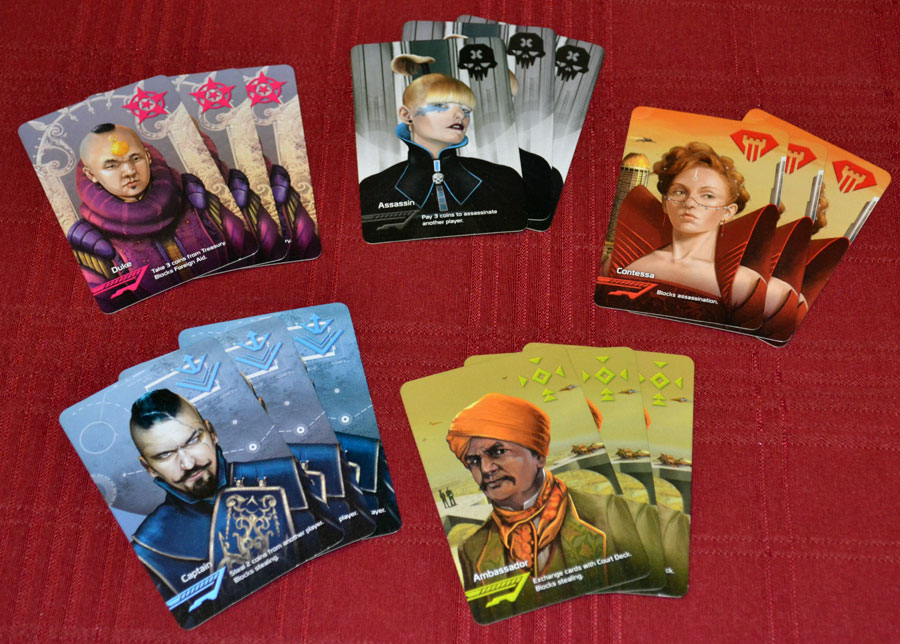Coup is a board game whose themes are deception, bluffing, and battle of wit.

Formal Elements
Players
Coup supports 2-6 players. In each game, players compete in a multilateral fashion, where each player is on their own and directly compete against other players. In certain situations, cooperating can also be desirable, but since deception is an important aspect of the game, the players need to be keen on who they can trust.
Objectives
The overarching objectives of Coup are capture and outwit. You need to see through other players’ lies and bluff in the way so that other players believe you; this is the outwit aspect of the game. Your ultimate objective is to make other players lose their identity cards; this is the capture aspect of the game.
Procedure
The game proceeds in a turn-by-turn fashion, where all players take turn to take actions. In each Coup game, each player gets two identity cards which indicate their roles for the game. Each identity card can be one of five available occupations, each having a unique skill. The identity cards are hidden from other players at the start. In one player’s turn, they can choose one from a set of actions to conduct. Depending on what identities the players own, some of the actions are truthful while others are not. After hearing the current player’s claim of which action to take, other players can choose whether to doubt the action or not. If no one doubts, then the action becomes valid. If any of the other players chooses to doubt, the action taker must reveal whether they own the identity that allows the action. If they own the identity card, the doubter loses one identity card and the action becones valid. If they do not own the identity card, then the action is invalid, and they lose one identity card. If a player loses both of the identity cards, they are out of the game. The last player that stands wins the game.
Resources
The most important resources of the game are coins and lives. Almost every offensive action requires coins, and some identites can help with gaining coins. Number of lives equivalent to the number of active identity cards you own, which means that in addition to a indicator of whether you are still in the game, lives also dictates which identities are still intact and in turn which actions are still available to you.
Rules

Above are the identity cards of Coup: Duke, Assassin, Contessa, Captain, and Ambassador. Some identities are offensive such as Assassin, who can conduct assassination upon another player, which only needs a very low number of coins, and Captain, who can steal coins from other players. Other identites provide utilities and defense power: Duke can gain coins fast, Contessa can block assassination, and Ambassador can block stealing.
Outcome
The outcome of the game is a single winner, who survives till the end. A ranking can also be determined by the order of elimination of players.
Fun
Fellowship
Through rivalry and conflict, friendship is developed. The game puts a lot of emphasis on bluffing and deception, and when players conduct their actions, we learn from each other our playstyle. For example, some players might never lie, while some other players are good liars. We might discover something we never knew about another person, and we might be surprised by how intricate other people’s thought processes are. As we are learning, we obtain the fun of fellowship.
Challenge
How do we lie so that other people can believe us? How do we see through other people’s lies? There are various potential sources of information in the game, which, if observed and understood well, can help such decisions. For example, the total number of identity cards are 15. If you own two of the same identity cards, you know there is only one identity card of that kind that can be in other people’s hands. As a result, if any player claims to do some action that is unique to that identity card, there is a high chance that they are lying. Such skills of deduction, observation, and estimation of risk are needed in the game in order to win, and in turn they provide the fun of challenge.
What Can Be Improved
The biggest thing I would like to add to this game is some randomness in available identites. The fact that there are only 5 identities and 15 identity cards in total can make the game stale quite quicly. I think more identity cards can be designed, and in each game, a random subset of size 15 are selected from all the identity cards, so that in each game, we have different set of identity cards to deal with, thus expanding the scope of possibilities in gameplay.


